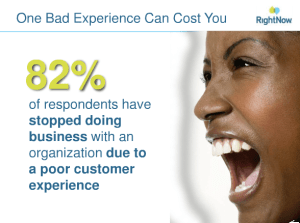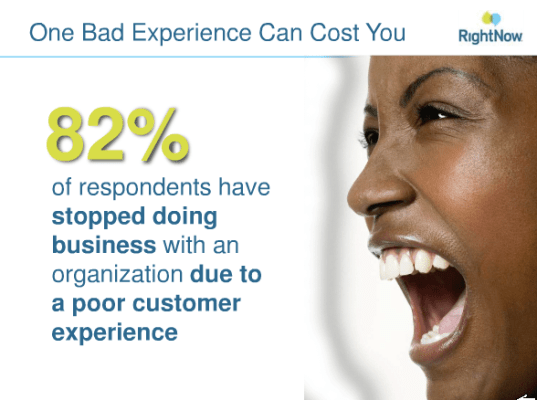
The spotlight — or maybe the flood light — shines on bad customer service online. Companies should worry about public complaints and reports of their brand failures more than ever, suggests a new report from RightNow and Harris Interactive. Contrarily, they stand to make more money if they can deliver a superior experience, the report says.
The Customer Experience Impact 2010 report reveals that 82% of consumers in the U.S. said they’ve stopped doing business with a company due to a poor customer service experience. Of these, 73% cited rude staff as the primary pain point, and 55% said a company’s failure to resolve their problems in a timely manner drove them away.
Almost everybody surveyed, a full 95%, said after a bad customer experience they would “take action.” 79% of U.S. consumers said they blabbed about their negative customer experiences in public and amongst friends. Of consumers who took to social media sites including Facebook and Twitter to publicly air a complaint, 58% expected a response from the company, 42% expected a response from a company within a day, but only 22% said they’d actually gotten a response as a result of griping there.
RightNow’s chief marketing officer Jason Mittelstaedt shared these insights, which were not published in his company’s 2010 report, exclusively with TechCrunch:
In 2007, 60% of U.S. consumers said when they had a negative customer experience, they wanted to speak to a live agent about it. At that time, 26% preferred email, 5% chat, but Facebook and Twitter weren’t used by corporations to handle complaints and resolve problems. This year, 83% of U.S. consumers said they wanted to speak to a live agent, 66% preferred email, 12% chat, and 7% choose social networking sites when trying to resolve a problem.
The more digital communication options that consumers have, apparently, the more they crave human interaction in real time, apparently.
What’s a company suffering from a bad customer service rep to do?
Clearly they can’t stop the customer noise online. The complaint of the decade, Dell Hell is still being discussed widely online and by major business news outlets, though Jeff Jarvis and Dell attempted to make peace back in 2007.
This month, Google’s Marissa Mayer noted her displeasure with Delta (see: screen capture below) on Twitter — she has about 47,000 followers there.

Earlier complaints about Delta and Virgin America published here, saw an immediate and passionate response from readers. The Delta Flight 1843 From JFK To Hell post received sympathy in the form of 1,000 Facebook-likes, so far.
And in the interest of fair disclosure: Consumer advocate blogger Christopher Elliot reported that AOL, which recently acquired TechCrunch, is consistently ranked as one of the worst providers of customer service in the U.S. in the Hall of Shame surveys conducted by MSN and Zogby.
RightNow’s Mittelstaedt suggests that companies facing a bad rep for customer service — while they work to improve the customer experience they provide, internally — should focus on generating positive word of mouth online and off most of all, than positive reviews and online feedback secondarily.
In other words, friends and colleagues endorsements, discussed in real life or through Twitter and Facebook updates, are most likely to drive sales than even a positive user review posted on a site like Yelp or Amazon (but those matter too).
MIttelstaedt also suggests companies go ahead and invest serious time and money in customer service. It’s not just an operational thing, anymore. And the investments should come back to the bottom line: 85% of U.S. consumers say they would pay 5% to 25% more to ensure a superior customer experience.
[Editor’s note: At TechCrunch Disrupt in San Francisco in September, the Startup Battlefield competition included pitches from Gri.pe and Tello, companies that use mobile apps to amplify and organize customer service complaints and kudos, and that help companies understand and address how their rep is trending in real time.]
